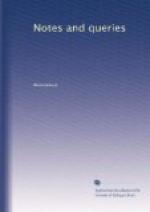I embrace this opportunity of submitting another conjecture respecting a word in MR. THORPE’S edition of the Anglo-Saxon Paraphrase of the Psalms. It occurs in Ps. cvi. ver. 10., “Quid exacerbaverunt eloquium Domini,” &c., which is rendered: “Forthon hidydan Drihtnes spraece aegwaes aegype.” In a note MR. THORPE says: “aegype, non intelligo,” and gives a reason for deeming the passage corrupt. To me it seems to express the generally accepted sense of exacerbaverunt: and here a cognate language will show us the way. Icelandic geip, futilis exaggeratio; atgeipa, exaggerare, effutire: aegype, then, means to mock, to deride, and is allied to gabban, to gibe, to jape. In the Psalter published by Spelman it is rendered: hi gremedon spraece godes. In Notker it is widersprachen, and in the two old Teutonic interlinear version of the Psalms, published by Graff, verbitterten and gebittert. Let us hear our own interesting old satirist, Piers Plouhman [Whitaker’s ed. p. 365.]:
And God wol nat be gyled, quoth Gobelyn, ne be japed.
But I cease, lest your readers should exclaim, Res non verba. When I have more leisure for word-catching, should you have space, I may furnish a few more.
S.W. SINGER.
Feb. 11. 1850.
AElfric’s Colloquy.—I have my doubts whether MR. SINGER’S ingenious suggestions for explaining the mysterious word sprote can be sustained. The Latin sentence appears clearly to end with the word natant, as is not only the case in the St. John’s MS., mentioned in MR. THORPE’S note, but in fact, also in the Cottonian MS. There is a point after natant, and then follows the word Saliu (not salu) with a capital S. Any person who examines the handwriting of this MS. will see that the word, whatever the transcriber may have understood by it, was intended by him to stand alone. He must, however, have written it without knowing what it meant; and then comes the difficulty of explaining how it got into the MS. from which he copied. It has always appeared to me probable that the name of some fish, having been first interlined, was afterwards inserted at random in the text, and mis-spelt by a transcriber who did not know its meaning. A word of common occurrence he would have been less likely to mistake. Can saliu be a mistake for salar, and sprote the Anglo-Saxon form of the corresponding modern word sprod, i.e. the salmon of the second year? The salar is mentioned by Ausonius in describing the river Moselle and its products (Idyll. 10, l. 128.). {249}
“Teque inter species
geminas neutrumque et utrumque,
Qui necdum salmo, nec
jam salar, ambiguusque
Amborum medio fario
intercepte sub aevo.”
I throw out this conjecture to take its chance of refutation or acceptance. Valeat quantum!




